Fleurs du Mal Magazine


![]() Een indrukwekkend en tegelijkertijd confronterend tijdsdocument, waarin de pijnlijke gevolgen van de economische crisis, die sinds 2008 de wereld in zijn greep houdt, zijn opgetekend.
Een indrukwekkend en tegelijkertijd confronterend tijdsdocument, waarin de pijnlijke gevolgen van de economische crisis, die sinds 2008 de wereld in zijn greep houdt, zijn opgetekend.
Door de ogen van grafisch ontwerper Richard Sluijs – bij aanvang nog een relatieve buitenstaander in een land dat de dans leek te ontspringen – wordt het persoonlijke leed dat velen trof op monumentale wijze in beeld gebracht. Een verzameling verhalen van mensen die hun ellende niet langer konden verdragen, en zelfmoord als enige uitweg uit hun problemen zagen.
Het boek is een in memoriam voor alle slachtoffers van de crisis, en tegelijkertijd vormt het een kritisch tegengeluid voor de boodschap die politici, bankiers en economen propageren dat het strenge bezuinigingsbeleid zijn vruchten begint af te werpen en alles weldra weer bij het oude zal zijn. Want dat voor vele nabestaanden het leven nooit meer hetzelfde zal zijn, werd helaas ook voor de schrijver de trieste realiteit toen het boek na 6 jaar research bijna gereed was.
![]()
THE COMPLETE LEXICON OF CRISIS RELATED SUICIDES 2008-2013 VOLUME 1
Auteur: Richard Sluijs
Jaartal: 2014-11-20
Afmetingen: 15,5 x 24,5 cm, 6 cm dik
Pagina’s: 712 pagina’s met witte bedrukking
ISBN: 978-94-91525-37-7
Uitvoering: Hardcover, rood linnen, genaaid gebrocheerd, zwart op snee, zwart leeslint
NUR: 740
34,- EURO
Uitgeverij: d’jonge Hond / Komma
fleursdumal.nl magazine
More in: - Book News, Art & Literature News, Galerie des Morts, Suicide

Alfred Lord Tennyson
(1809-1892)
The Brook
I come from haunts of coot and hern,
I make a sudden sally
And sparkle out among the fern,
To bicker down a valley.
By thirty hills I hurry down,
Or slip between the ridges,
By twenty thorpes, a little town,
And half a hundred bridges.
Till last by Philip’s farm I flow
To join the brimming river,
For men may come and men may go,
But I go on for ever.
I chatter over stony ways,
In little sharps and trebles,
I bubble into eddying bays,
I babble on the pebbles.
With many a curve my banks I fret
By many a field and fallow,
And many a fairy foreland set
With willow-weed and mallow.
I chatter, chatter, as I flow
To join the brimming river,
For men may come and men may go,
But I go on for ever.
I wind about, and in and out,
With here a blossom sailing,
And here and there a lusty trout,
And here and there a grayling,
And here and there a foamy flake
Upon me, as I travel
With many a silvery waterbreak
Above the golden gravel,
And draw them all along, and flow
To join the brimming river
For men may come and men may go,
But I go on for ever.
I steal by lawns and grassy plots,
I slide by hazel covers;
I move the sweet forget-me-nots
That grow for happy lovers.
I slip, I slide, I gloom, I glance,
Among my skimming swallows;
I make the netted sunbeam dance
Against my sandy shallows.
I murmur under moon and stars
In brambly wildernesses;
I linger by my shingly bars;
I loiter round my cresses;
And out again I curve and flow
To join the brimming river,
For men may come and men may go,
But I go on for ever.
Alfred Lord Tennyson poetry
fleursdumal.nl magazine
More in: Archive S-T, Tennyson, Alfred Lord
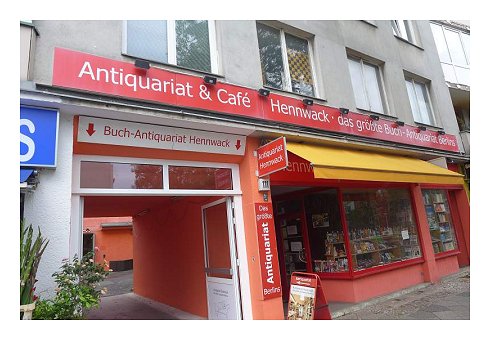
‘Das grösste Antiquariat Berlins’
Tegenwoordig komt het er nauwelijks meer van. Maar vroeger vond ik het een aantrekkelijke manier om een grote stad te verkennen: van het ene naar het andere antiquariaat. Want je kwam dan vaak op plekken waar je anders nooit heen zou zijn gegaan en hoefde niets te vinden om toch een leuke dag te hebben. Maar internet heeft ook wat dat betreft veel veranderd – vele antiquariaten verdwenen of zijn nog enkel virtueel te bezoeken.
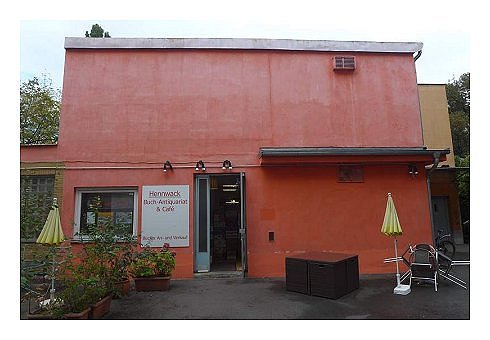
In Berlijn zijn gelukkig nog genoeg antiquariaten om de hierboven weg te volgen, al is ook daar de spoeling dunner geworden, zo merkte ik afgelopen september. Maar goed, zoveel tijd wilde ik deze keer niet spenderen. Ik koos meteen maar voor ‘Buch-Antiquariat Hennwack, das grösste Antiquariat Berlins’. De boekhandel ligt aan de Albrechtstrasse in Berlin-Steglitz en is grotendeels gevestigd in een voormalige drukkerij, te bereiken via een poort en binnenplaats. ‘Wir bieten Ihnen ca. 270.000 Bücher auf 1300 Quadratmetern’, meldt een keurige folder die al klaar ligt op de balie. Daarchter zit een vriendelijke man, op dat moment het enige personeelslid. Of ik foto’s mag maken? Dat kan ik beter aan zijn baas vragen.
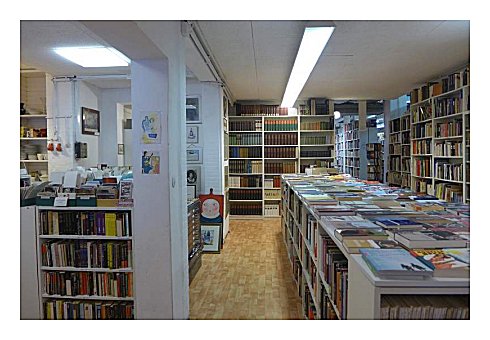
In afwachting van diens komst bezoek ik ‘mijn afdeling’: fotoboeken. Zeker, ze hebben er heel wat staan, maar kwantiteit is iets anders dan kwaliteit. Interessanter is om gang in gang uit te lopen langs de meest uiteenlopende boeken, keurig gerubriceerd – van wetenschappelijke literatuur tot Russische boeken, van judaica tot ‘Orientalistik’. Alleen al met de tijdschriften zou je een aparte winkel kunnen vullen. Er lopen overigens nauwelijks klanten rond. Het ‘Bücher-Café’ lijkt ook gesloten.
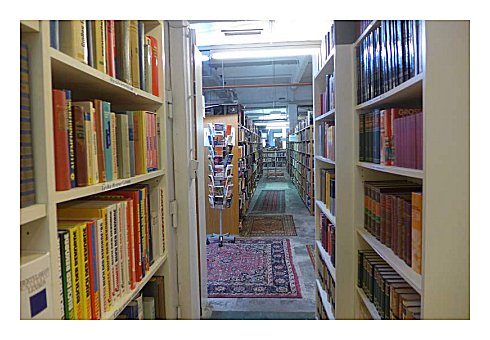
Kijk, daar arriveert de baas. Ik mag fotograferen wat ik wil. Wist ik trouwens dat ze ook de beschikking hebben over een ‘bequemes Online-Shop-System’? Even later gaat hij zelf het internet op terwijl ik nogmaals het papieren labyrint betreed, ditmaal om wat foto’s te maken. Mooi dat Bertolt Brecht ook van de partij is.
Joep Eijkens
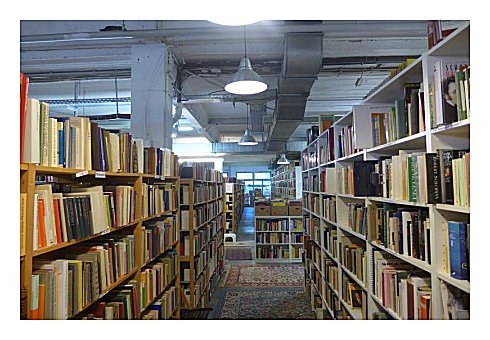
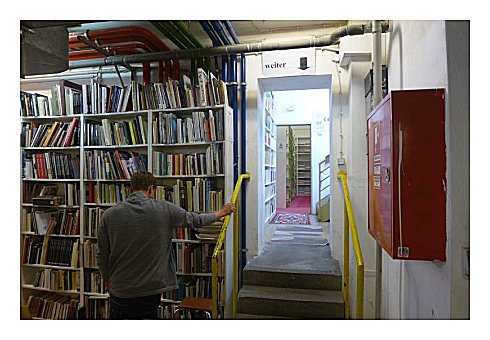
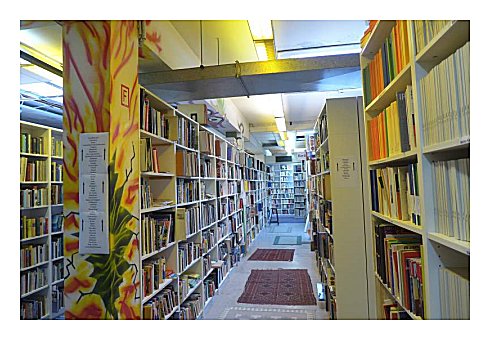
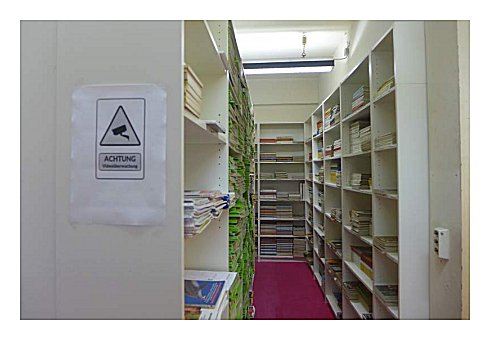

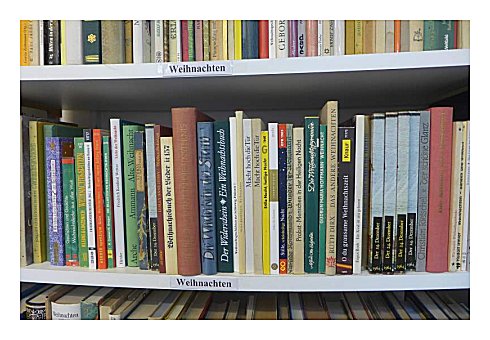
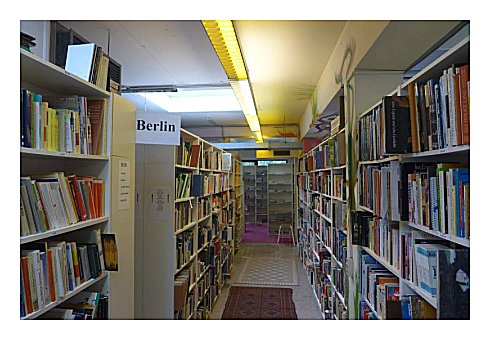
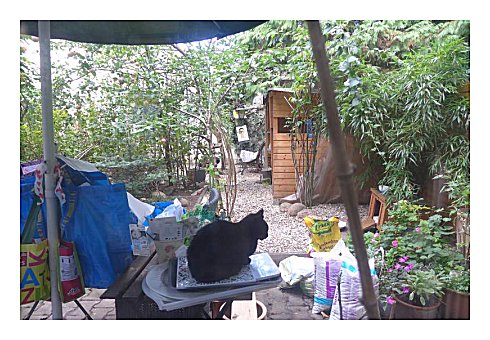
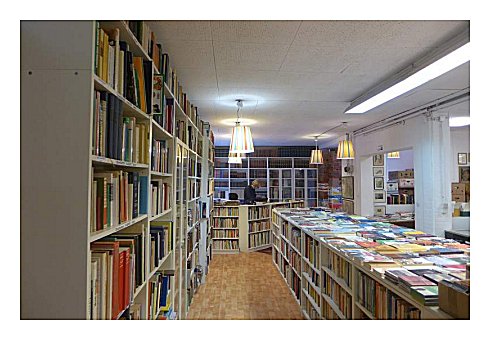
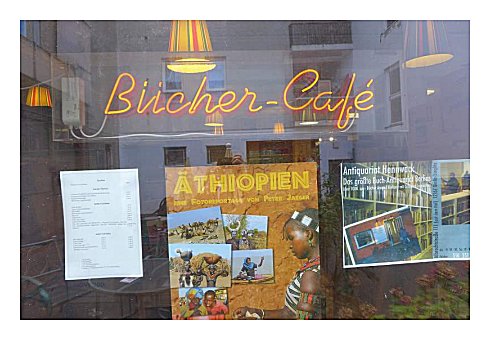
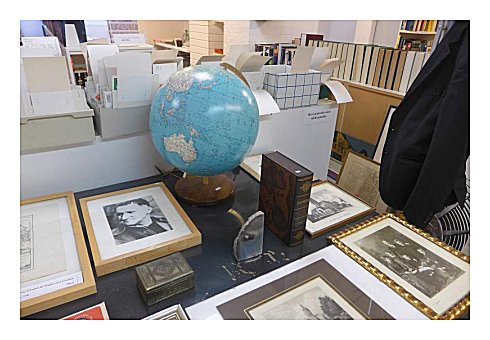
Tekst en fotografie Joep Eijkens
fleursdumal.nl magazine
More in: - Bookstores, FDM in Berlin, Galerie Deutschland, Joep Eijkens Photos, Nachrichten aus Berlin
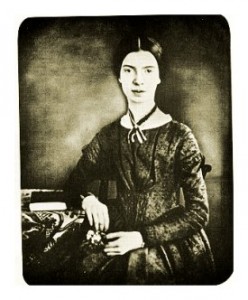
Emily Dickinson
(1830-1886)
The Martyr Poets
The Martyr Poets did not tell,
But wrought their Pang in syllable:
That, when their mortal name be numb,
Their mortal fate encourage Some.
The Martyr Painters never spoke,
Bequeathing—rather—to their Work:
That when their conscious fingers cease,
Some seek in Art the Art of Peace.
[4-voetige jambische regels, rijmschema aabb, 1 halfrijm]
De Dichter Martelaars
De Dichter Martelaars spraken niet,
Hun pijn bleek sprekend uit hun lied:
Dat men, hun naam gedood voorgoed,
Soms uit hun noodlot put voor moed.
De Schilder Martelaars, spraken nooit,
Vermaakten— veeleer—Werk voltooid;
Dat men, hun hand zijn vormkracht kwijt,
Uit Kunst, soms Vredeskunst bereidt.
Vertaling Cornelis W. Schoneveld
fleursdumal.nl magazine
More in: Archive C-D, Dickinson, Dickinson, Emily, TRANSLATION ARCHIVE
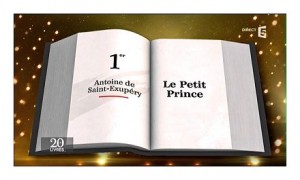 A l’occasion des 20 ans de France 5, l’émission “La grande librairie” a donne la parole: Un livre a-t-il changé votre vie ? Lequel ? Pourquoi ?
A l’occasion des 20 ans de France 5, l’émission “La grande librairie” a donne la parole: Un livre a-t-il changé votre vie ? Lequel ? Pourquoi ?
LES RESULTATS
LES 20 LIVRES QUI ONT CHANGÉ VOTRE VIE
Quels sont les livres qui ont changé votre vie ?
Voici le classement des 20 livres les plus cités à l’occasion de notre grand sondage auprès des téléspectateurs :
1 – “Le petit prince” – Antoine de Saint-Exupéry
2 – “L’étranger” – Albert Camus
3 – “Voyage au bout de la Nuit” – Louis-Ferdinand Céline
4 – “L’écume des jours” – Boris Vian
5 – “A la recherche du temps perdu” – Marcel Proust
6 – “Le Grand Meaulnes” – Alain Fournier
7 – “L’alchimiste” – Paulo Coelho
8 – “Belle du seigneur” – Albert Cohen
9 – “Cent ans de solitude” – Gabriel García Márquez
10 – “Les Fleurs du Mal” – Charles Baudelaire
11 – “La Peste” – Albert Camus
12 – Harry Potter – J. K. Rowling
13 – “1984” – George Orwell
14 – “Le monde selon Garp” – John Irving
15 – “Crime et Châtiment” – Fiodor Dostoïevski
16 – “Le seigneur des Anneaux” – J.R.R. Tolkien
17 – “Le Parfum” – Patrick Süskind
18 – “Le journal d’Anne Frank” – Anne Frank
19 – “Madame Bovary” – Gustave Flaubert
20 – “Les Misérables” – Victor Hugo
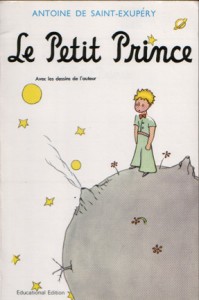
LGL, décembre 2014
# INFO website LA GRANDE LIBRAIRIE
fleursdumal.nl magazine
More in: - Book Lovers, - Book Stories, Antoine de Saint-Exupéry, Art & Literature News, George Orwell
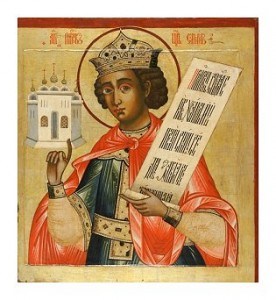
Chapter 1
The song of songs, which is Solomon’s.
Let him kiss me with the kisses of his mouth: for thy love is better than wine.
Because of the savour of thy good ointments thy name is as ointment poured forth, therefore do the virgins love thee.
Draw me, we will run after thee: the king hath brought me into his chambers: we will be glad and rejoice in thee, we will remember thy love more than wine: the upright love thee.
I am black, but comely, O ye daughters of Jerusalem, as the tents of Kedar, as the curtains of Solomon.
Look not upon me, because I am black, because the sun hath looked upon me: my mother’s children were angry with me; they made me the keeper of the vineyards; but mine own vineyard have I not kept.
Tell me, O thou whom my soul loveth, where thou feedest, where thou makest thy flock to rest at noon: for why should I be as one that turneth aside by the flocks of thy companions?
If thou know not, O thou fairest among women, go thy way forth by the footsteps of the flock, and feed thy kids beside the shepherds’ tents.
I have compared thee, O my love, to a company of horses in Pharoah’s chariots.
Thy cheeks are comely with rows of jewels, thy neck with chains of gold.
We will make thee borders of gold with studs of silver.
While the king sitteth at his table, my spikenard sending forth the smell thereof.
A bundle of myrrh is my well-beloved unto me; he shall lie all night betwixt my breasts.
My beloved is unto me as a cluster of camphire in the vineyards of Engedi.
Behold, thou art fair, my love; behold, thou art fair; thou hast doves’ eyes.
Behold thou art fair, my beloved, yea pleasant: also our bed is green.
The beams of our house are cedar, and our rafters of fir.
Chapter 2
I am the rose of Sharon, and the lily of the valleys.
As the lily among thorns, so is my love among the daughters.
As the apple tree among the trees of the wood, so is my beloved among the suns. I sat down under his shadow with great delight, and his fruit was sweet to my taste.
He brought me to the banquetting house, and his banner over me was love.
Stay me with flagons, comfort me with apples: for I am sick of love.
His left hand is under my head, and his right hand doth embrace me.
I charge you, O ye daughters of Jerusalem, by the roes, and by the hinds of the field, that ye stir not up, nor awake my love, till he please.
The voice of my beloved! behold, he cometh leaping upon the mountains, skipping upon the hills.
My beloved is like a roe or a young hart: behold, he standeth behind our wall, he looketh forth at the windows, shewing himself through the lattice.
My beloved spake, and said unto me, Rise up, my love, my fair one, and come away.
For, lo, the winter is past, the rain is over and gone;
The flowers appear on the earth; the time of the singing of birds is come, and the voice of the turtle is heard in our land;
The fig tree putteth forth her green figs, and the vines with the tender grape give a good smell. Arise, my love, my fair one, and come away.
O my dove, that art in the clefts of the rock, in the secret places of the stairs, let me see thy countenance, let me hear thy voice; for sweet is thy voice, and thy countenance is comely.
Take us the foxes, the little foxes, that spoil the vines: for our vines have tender grapes.
My beloved is mine, and I am his; he feedeth among the lilies.
Until the day break, and the shadows flee away, turn, my beloved, and be thou like a roe or a young hart upon the mountains of Bether.
Chapter 3
By night on my bed I sought him whom my soul loveth: I sought him, but I found him not
I will rise now, and go about the city in the streets, and in the broad ways I will seek him whom my soul loveth: I sought him, but I found him not.
The watchman that go about the city found me: to whom I said, Saw ye him whom my soul loveth?
It was but a little that I passed from them, but I found him who my soul loveth: I held him, and would not let him go, until I had brought him into my mother’s house, and into the chamber of her that had conceived me.
I charge you, O ye daughters of Jerusalem, by the roes, and by the hinds of the field, that ye stir not up, nor awake my love, till he please.
Who is this that cometh out of the wilderness like pillars of smoke, perfumed with myrrh and frankincense, with all powders of the merchant?
Behold his bed, which is Solomon’s; threescore valiant men are about it, of the valiant of Israel.
They all hold swords, being expert in war: every man has his sword upon his thigh because of fear in the night.
King Solomon made himself a chariot of the wood of Lebanon.
He made the pillars thereof of silver, the bottom thereof of gold, the covering of it of purple, the midst thereof being paved with love, for the daughters of Jerusalem.
Go forth, O ye daughters of Zion, and behold King Solomon with the crown wherewith his mother crowned him in the day of his espousals, and in the day of the gladness of his heart.
Chapter 4
Behold, thou art fair, my love; behold, thou art fair; thou hast doves’ eyes within thy locks, thy hair is a flock of goats, that appear from mount Gilead.
Thy teeth are like a flock of sheep that are even shorn, which came up from the washing; whereof every one bear twins, and none is barren among them.
Thy lips are like a thread of scarlet, and thy speech is comely: thy temples are like a piece of pomegranate within thy locks.
Thy neck is like the tower of David builded for an armoury, whereupon there hang a thousand bucklers, all shields of mighty men.
Thy two breasts are like two young roes that are twins, which feed among the lilies.
Until the day break, and the shadows flee away, I will get me to the mountain of myrrh, and to the hill of frankincense.
Thou art all fair, my love; there is no spot in thee.
Come with me from Lebanon, my spouse, with me from Lebanon: Look from the top of Amana, from the top of Shenir and Hermon, from the lions’ dens, from the mountains of the leopards.
Thou hast ravished my heart, my sister, my spouse; thou hast ravished my heart with one of thine eyes, with one chain of thy neck.
How fair is thy love, my sister, my spouse! how much better is thy love than wine! and the smell of thy ointments than all spices!
Thy lips, O my spouse, drop as the honeycomb: honey and milk are under thy tongue; and the smell of thy garments is like the smell of Lebanon.
A garden inclosed is my sister, my spouse; a spring shut up, a fountain sealed.
Thy plants are an orchard of pomegranates, with pleasant fruits; camphire, with spikenard,
Spikenard and saffron; calamus and cinnamon, with all trees of frankincense; myrrh and aloes, with all the chief spices:
A fountain of gardens, a well of living waters, and streams from Lebanon.
Awake, O north wind; and come, thou south; blow upon my garden, that the spices thereof may flow out. Let my beloved come into his garden, and eat his pleasant fruits.
Chapter 5
I am come into my garden, my sister, my spouse: I have gathered my myrrh with my spice; I have eaten my honeycomb with my honey; I have drunk my wine with my milk: eat, O friends; drink, yea, drink abundantly, O beloved.
I sleep, but my heart waketh: it is the voice of my beloved that knocketh, saying, Open to me, my sister, my love, my dove, my undefiled: for my head is filled with dew, and my locks with the drops of the night.
I have put off my coat; how shall I put it on? I have washed my feet; how shall I defile them?
My beloved put in his hand by the hole of the door, and my bowels were moved for him.
I rose up to open to my beloved; and my hands dropped with myrrh, and my fingers with sweet-smelling myrrh, upon the handles of the lock.
I opened to my beloved; but my beloved had withdrawn himself, and was gone; my soul failed when he spake: I sought him, but I could not find him; I called him, but he gave me no answer.
The watchmen that went about the city found me, they smote me, they wounded me; the keepers of the walls took away my veil from me.
I charge you, O daughters of Jerusalem, if ye find my beloved, that ye tell him, that I am sick of love.
What is thy beloved more than another beloved, O thou fairest among women? what is thy beloved more than another beloved, that thou dost so charge us?
My beloved is white and ruddy, the chiefest among ten thousand.
His head is as the most fine gold, his locks are bushy, and black as a raven.
His eyes are as the eyes of doves by the rivers of waters, washed with milk, and fitly set.
His cheeks are as a bed of spices, as sweet flowers: his lips like lillies, dropping sweet smelling myrrh.
His hands are as gold rings set with the beryl: his belly is as bright ivory overlaid with sapphires.
His legs are as pillars of marble, set upon sockets of fine gold: his countenance is as Lebanon, excellent as the cedars.
His mouth is most sweet: yea, he is altogether lovely. This is my beloved, and this is my friend, O daughters of Jerusalem.
Chapter 6
Whither is thy beloved gone, O thou fairest among women? whither is thy beloved turned aside? that we may seek him with thee.
My beloved is gone down into his garden, to the beds of spices, to feed in the gardens, and to gather lilies.
I am my beloved’s, and my beloved is mine: he feedeth among the lilies.
Thou art beautiful, O my love, as Tirzah, comely as Jerusalem, terrible as an army with banners.
Turn away thine eyes from me, for they have overcome me: thy hair is as a flock of goats that appear from Gilead.
Thy teeth are as a flock of sheep which go up from the washing, whereof every one beareth twins, and there is not one barren among them.
As a piece of a pomegranate are thy temples within thy locks.
There are threescore queens, and fourscore concubines, and virgins without number.
My dove, my undefiled is but one; she is the only one of her mother, she is the choice one of her that bare her. The daughters saw her, and blessed her; yea, the queens and the concubines, and they praised her.
Who is she that looketh forth as the morning, fair as the moon, clear as the sun, and terrible as an army with banners?
I went down into the garden of nuts to see the fruits of the valley, and to see whether the vine flourished, and the pomegranates budded.
Or ever I was aware, my soul made me like the chariots of Amminadib.
Return, return, O Shulamite; return, return, that we may look upon thee. What will ye see in the Shulamite? As it were the company of two armies.
Chapter 7
How beautiful are thy feet with shoes, O prince’s daughter! the joints of thy thighs are like jewels, the work of the hands of a cunning workman.
Thy navel is like a round goblet, which wanteth not liquor: thy belly is like an heap of wheat set about with lilies.
Thy two breasts are like two young roes that are twins.
Thy neck is as a tower of ivory; thine eyes like the fishpools in Heshbon, by the gate of Bathrabbim: thy nose is as the tower of Lebanon which looketh toward Damascus.
Thine head upon thee is like Carmel, and the hair of thy head like purple; the king is held in the galleries.
How fair and how pleasant art thou, O love, for delights!
This thy stature is like to a palm tree, and thy breasts to clusters of groups.
I said, I will go up to the palm tree, I will take hold of the boughs thereof: now also thy breasts shall be as clusters of the vine, and the smell of thy nose like apples;
And the roof of thy mouth like the best wine for my beloved, that goeth down sweetly, causing the lips of those that are asleep to speak.
I am my beloved’s, and his desire is toward me.
Come, my beloved, let us go forth into the field; let us lodge in the villages.
Let us get up early to the vineyards; let us see if the vine flourish, whether the tender grape appear, and the pomegranates bud forth: there will I give thee my loves.
The mandrakes give a smell, and at our gates are all manners of pleasant fruits, new and old, which I have laid up for thee, O my beloved.
Chapter 8
O that thou wert as my brother, that sucked the breasts of my mother! when I should find thee without, I would kiss thee; yea, I should not be despised.
I would lead thee, and bring thee into my mother’s house, who would instruct me: I would cause thee to drink of spiced wine of the juice of my pomegranate.
His left hand should be under my head, and his right hand should embrace me.
I charge you, O daughters of Jerusalem, that ye stir not up, nor awake my love, until he please.
Who is this that cometh up from the wilderness, leaning upon her beloved? I raised thee up under the apple tree: there thy mother brought thee forth: there she brought thee forth that bare thee.
Set me as a seal upon thine heart, as a seal upon thine arm: for love is strong as death; jealousy is cruel as the grave: the coals thereof are coals of fire, which hath a most vehement flame.
Many waters cannot quench love, neither can the floods drown it: if a man would give all the substance of his house for love, it would utterly be contemned.
We have a little sister, and she hath no breasts: What shall we do for our sister in the day when she shall be spoken for?
If she be a wall, we will build upon her a palace of silver: and if she be a door, we will inclose her with boards of cedar.
I am a wall, and my breasts like towers: then was I in his eyes as one that found favour.
Solomon had a vineyard at Baalhamon; he let out the vineyard unto keepers; every one for the fruit thereof was to bring a thousand pieces of silver.
My vineyard, which is mine, is before me: thou, O Solomon, must have a thousand, and those that keep the fruit thereof two hundred.
Thou hast dwellest in the gardens, the companions hearken to thy voice: cause me to hear it.
Make haste, my beloved, and be thou like to a roe or to a young hart upon the mountains of spices.
From the Authorized King James Version of the Christian Bible
Solomon, King of Israel, 970-933 BC
fleursdumal.nl magazine
More in: Archive S-T, CLASSIC POETRY
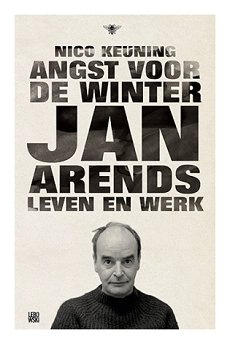 VPRO Boeken zondag 21 december
VPRO Boeken zondag 21 december
Dirk de Wachter, psychiater en psychotherapeut, houdt in zijn nieuwe boek ‘Liefde. Een onmogelijk verlangen‘ een pleidooi om gewoon te doen.
Ook te gast is neerlandicus Nico Keuning over zijn heruitgegeven en herziene biografie van Jan Arends getiteld ‘Angst voor de winter’.
Dirk de Wachter & Nico Keuning
VPRO Boeken zondag 21 december 2014
NPO 1, 11.20 uur
fleursdumal.nl magazine
More in: - Book News, Art & Literature News

Alleen Josanna, de kleine heks, had net zulke varkensachtige oogjes als de slager en kon net zo onbeheerst tegen alles tekeergaan als dat in haar opkwam. De anderen hadden alles van de moeder, die hen vanuit de winkeldeur nakeek. De vrouw verwende haar kinderen. Dat was alleen al aan hun kleren te zien, die veel mooier waren dan nodig was. De manie van een vrouw die in haar kinderen de eigen jeugd weerspiegeld zag. Waar ze heimwee naar had, omdat haar jeugd haar meer beloofd had dan wat er in werkelijkheid van haar leven terecht was gekomen. Nooit had iemand begrepen hoe deze vrouw met slager Azurri had kunnen trouwen. Was ze aan hem verkocht voor een koe en een half varken? Hoe in jezusnaam kon een mooie vrouw het haar leven lang uithouden bij een ongelikte beer voor wie het niks betekende om dieren af te maken? Kwam zij, die zo naar tederheid hunkerde, geen liefde te kort bij een vent die niet veel meer dan een moordenaar was? Ze had veel behoefte aan warmte. Hoe kon ze dan naar bed gaan met een man voor wie ze niet veel meer was dan een stuk inventaris van zijn bloederige bedrijf?
Hoewel ze nog maar kinderen waren en hoewel het er eigenlijk veel te warm voor was, waren de meisjes Azurri in uitdagend lange kleren gehuld die hun voeten bedekt hielden en die in wijde plooien tot op het gras vielen. Ze leken als vlinders rond te fladderen in hun veelkleurige jurken die met gouddraad waren afgezet en die hun smalle meidenlijven meer dan genoeg verborgen. Bij Angela echter was de lichte zwelling van haar borstjes onder de stof te zien. Soms hoorden ze hoe de zieke jongen in zijn bed om iets leek te roepen. Dat deuntje kenden ze vanbuiten. Dat hoorden ze al dagenlang. Zo hard waren kinderen. Indien nodig zouden ze alles wat hen in hun jonge leven bezig had gehouden, in één tel opzij kunnen zetten.
Alleen Angela, met haar dertien jaar de oudste van het vierspan, luisterde een ogenblik naar de jongen. Ze zou wel naar hem toe willen gaan om hem te vragen waar hij zo onophoudelijk om riep. Ze durfde niet. Ze was bang voor de timmerman die woedend kon uitvallen en die haar misschien ook nu zou wegsturen. Hij joeg kinderen altijd weg, omdat ze hem voor de voeten liepen. Eens had hij haar zelfs geslagen toen hij haar en de jongen had betrapt bij het spelen tussen de krullen in zijn werkplaats. Josanna van elf, die altijd al een heks was geweest, deed bekkentrekkend het zieke kind na. Ze hield van pestspelletjes en kon de grootste lol hebben met het doodslaan van jonge vogeltjes of het verbranden van in papier gewikkelde kikkers. Die lage trek in haar karakter had ze van haar vader, die in de dieren die hij slachtte ook hulpeloze tegenstanders had.
Angela vond het bekkentrekken van haar zus ongepast. Ze waarschuwde Josanna niet te spotten met de zieke jongen. Door spotternij met het leed van een ander zou je diens ellende wel eens kunnen aantrekken. Toen de heks echter een gezicht trok of ze kotsen moest en het hulpeloze schreeuwen van de jongen nog eens nadeed, gaf Angela haar een draai om de oren. Maar Josanna trok zich daar geen moer van aan. Ze vond het extra leuk nu ze wist dat haar zus zich er zo aan ergerde. Gelukkig voor de jongen, voor wie dit alles bedoeld was, dat hij er geen weet van had. Margarita, een nimf van negen, en de kleine Irma van zes keken vol weerzin naar hun vader, die het levenloze varken met kokend water overgoot en de haren van de spekhuid schraapte. Er steeg een vette walm op van het dier. Voelde de slager aan, misschien in zijn onderbewuste, dat hij iets weerzinwekkends deed? In elk geval voelde hij zich gehinderd door de blikken van de meisjes, die het allemaal afschuwelijk vonden. Hoewel de kinderen haast elke dag dit schouwspel meemaakten, konden ze er niet aan wennen.
Ton van Reen: Landverbeuren (14)
wordt vervolgd
fleursdumal.nl magazine
More in: - Landverbeuren, Reen, Ton van
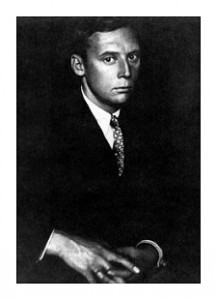
Johannes Theodor Baargeld
(1892-1927)
Es war einmal ein rares Kind
Es war einmal ein rares Kind,
Das war, wie solche Vöglein sind:
Sie wachsen und gedeihen
Und füttern ihre Eigenart
Vom alten Jahr zum neuen.
Es irrt der Mensch, solang er lebt,
Und Manches seltsam an ihm klebt,
Zumal wenn er nach Geistigem strebt;
Doch peinlich ist es immer,
Besteht sein ganzer Geistesschwanz
Aus allerfaulstem Flimmer.
Gib Mensch, solang Du geben kannst,
Bedenk zuletzt den eignen Wanst!
Wie schön wär’s unter Christen,
Lenkt nicht solch Vöglein eigner Art
Ins saubre Christennest die Fahrt:
Die Frucht aus seinem Nisten
darf dann der Christe misten.
Drum Mensch, siehst Du solch Vöglein ziehn
Dank Gott, wenn Winde er verliehn,
Die in die Täler streichen:
Denn zieht das Tierchen bei Dir ein,
So ist’s zum Herzerweichen.
(1922)
Johannes Theodor Baargeld poetry
fleursdumal.nl magazine
More in: Archive A-B, Baargeld, Johannes Theodor
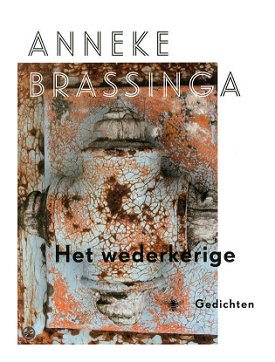
Het bestuur van de Stichting P.C. Hooft-prijs voor Letterkunde heeft afgelopen dinsdag bekend gemaakt dat de P.C. Hooft-prijs 2015 wordt toegekend aan de dichteres Anneke Brassinga (1948).
De P.C. Hooft-prijs is een van de belangrijkste literaire prijzen van Nederland. De oeuvreprijs wordt jaarlijks afwisselend toegekend voor proza, essays en poëzie. Dit jaar is de prijs, waaraan een bedrag is verbonden van 60.000 euro, bestemd voor poëzie.
De prijs wordt op 21 mei 2015, de sterfdag van dichter P.C. Hooft (1581-1647), uitgereikt.
Brassinga debuteerde in 1987 met de bundel Aurora. Daarna publiceerde ze nog een tiental dichtbundels. Haar laatste dichtbundel was, Ontij (2010). Anneke Brassinga publiceerde, naast poëzie, veel essays en verhalen. Verder heeft ze veel vertaalwerk verricht, waaronder de vertaling van boeken van o.a. schrijvers als Oscar Wilde, Jules Verne, Vladimir Nabokov en Sylvia Plath.
De dichteres wordt door de jury geprezen om het gebruik van bijna vergeten of in onbruik geraakte woorden. ‘In elk gedicht openen zich onvermoede vergezichten van zeggingskracht. De taal wordt omgekeerd, uitgekleed en weer opnieuw uitgedost totdat alle registers die er ooit in voorgekomen zijn weer meedoen.’
De jury van de prijs bestond dit jaar uit Wim Brands, Anja de Feijter, Rozalie Hirs, Erik Lindner en Maaike Meijer.
fleursdumal.nl magazine
More in: - Book News, Archive A-B, Art & Literature News, Sylvia Plath

The Sorrows of Young Werther (72) by J.W. von Goethe A neighbour saw the flash, and heard the report of the pistol; but, as everything remained quiet, he thought no more of it. In the morning, at six o'clock, the servant went into Werther's room with a candle. He found his master stretched upon the floor, weltering in his blood, and the pistols at his side. He called, he took him in his arms, but received no answer. Life was not yet quite extinct. The servant ran for a surgeon, and then went to fetch Albert. Charlotte heard the ringing of the bell: a cold shudder seized her. She wakened her husband, and they both rose. The servant, bathed in tears faltered forth the dreadful news. Charlotte fell senseless at Albert's feet.When the surgeon came to the unfortunate Werther, he was still lying on the floor; and his pulse beat, but his limbs were cold. The bullet, entering the forehead, over the right eye, had penetrated the skull. A vein was opened in his right arm: the blood came, and he still continued to breathe. From the blood which flowed from the chair, it could be inferred that he had committed the rash act sitting at his bureau, and that he afterward fell upon the floor. He was found lying on his back near the window. He was in full-dress costume. The Sorrows of Young Werther (Die Leiden des jungen Werther) by J.W. von Goethe. Translated by R.D. Boylan. To be continued fleursdumal.nl magazine
More in: -Die Leiden des jungen Werther, Goethe, Johann Wolfgang von
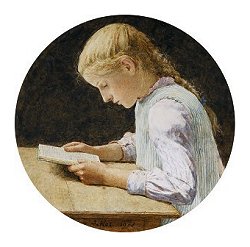
Lewis Carroll
(1832-1898)
Father William
‘You are old, Father William,’ the young man said,
‘And your hair has become very white;
And yet you incessantly stand on your head –
Do you think, at your age, it is right?’
‘In my youth,’ Father William replied to his son,
‘I feared it might injure the brain;
But now that I’m perfectly sure I have none,
Why, I do it again and again.’
‘You are old,’ said the youth, ‘as I mentioned before,
And have grown most uncommonly fat;
Yet you turned a back-somersault in at the door –
Pray, what is the reason of that?’
‘In my youth,’ said the sage, as he shook his grey locks,
‘I kept all my limbs very supple
By the use of this ointment – one shilling a box –
Allow me to sell you a couple?’
‘You are old,’ said the youth, ‘and your jaws are too weak
For anything tougher than suet;
Yet you finished the goose, with the bones and the beak –
Pray, how did you manage to do it?’
‘In my youth,’ said his father, ‘I took to the law,
And argued each case with my wife;
And the muscular strength that it gave to my jaw,
Has lasted the rest of my life.’
‘You are old,’ said the youth, ‘one would hardly suppose
That your eye was as steady as ever;
Yet you balanced an eel on the end of your nose –
What made you so awfully clever?’
‘I have answered three questions, and that is enough,’
Said his father; ‘don’t give yourself airs!
Do you think I can listen all day to such stuff?
Be off, or I’ll kick you down stairs!’
Lewis Carroll poetry
fleursdumal.nl magazine
More in: Archive C-D, Carroll, Lewis
Thank you for reading Fleurs du Mal - magazine for art & literature